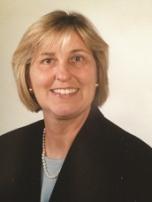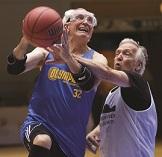
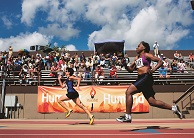
There’s no doubt people today are staying active longer than previous generations. The benefits of a healthful lifestyle are well-documented. In fact, at the end of 2014, the American College of Sports Medicine made the prediction that fitness programs for older adults would be one of the top 10 fitness trends of the year ahead, and that certainly has come to pass.
We can see the proof in registration numbers for the National Senior Games – we’re again expecting more than 10,000 athletes to attend, an achievement that has been accomplished for our past six consecutive events. That’s encouraging – not simply because everyone likes a successful event, but because so many people find fitness enjoyable enough to travel to take part in it. And it surprises some people – they’re used to seeing youth sports teams travel around the U.S., but they don’t give as much thought to senior athletes doing so. But here are some points they might not know, both about our Games and about today’s senior athletes in general.
Senior doesn’t mean what you think
The National Senior Games is open to all athletes age 50 and up. Sometimes people are surprised to learn what the minimum age is; they might not feel like a ‘senior’ at age 50. We often have to make them understand that senior does not mean elderly. Seniors aren’t necessarily retirees. We’re cognizant that many people who are between the ages of 50 and 60 are still working, so we try to accommodate by scheduling events closer to the weekend. We would like to grow the participation in that 50-60 age group.
The competition level
Occasionally, people think, ‘Oh, senior athletes. What kind of competition can there be?’ What they don’t realize is that some of the athletes are Olympians, former collegians or retired professional athletes. Some have been athletes all their lives and compete at a very high level.
When people find out what our athletes are capable of, you can see them having that ‘wow’ moment. This isn’t something you’ll only find at the National Senior Games, by the way; in just about every sport, there are athletes age 50 and up who are extremely fit and competitive.
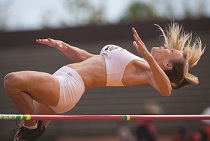
Another stereotype we can wipe out: Senior athletes aren’t drawn to chess and checkers and bingo. Our event is the largest multi-sport event in the world for seniors. Its 19 medal sports include everything from team pursuits like basketball, volleyball and softball to singular activities like track & field, swimming, road racing and triathlon.
Everyone has a story
People come into fitness for all different reasons. Some have been active all their lives, but some decided to take up a sport later in life. In particular, we hear stories from women who took up sports as adults because they were in high school before Title IX and weren’t able to participate in the sports they wanted. Now they’re really enjoying the ability to compete.
As mentioned before, some of our athletes are former professionals. Our rules state that in order to compete in our Games, you have to have been retired for at least 20 years from the sport in which you were a professional athlete. So, for example, if you were a professional basketball player, you would have to have been retired from that sport for 20 years before competing in basketball in the National Senior Games. (However, you could retire from basketball and the next year, compete in The Games in a different sport.
Not all senior athletes are in it to win it
Seniors participate in our Games for all different reasons, just as people of all ages all across the U.S. do with all sports. There are, as we mentioned, many very competitive athletes, but there are also many novice athletes. Then there are plenty of people who like the social experience of being part of The Games. They get to reconnect with friends, enjoy their sport, explore a new city and have a great time.
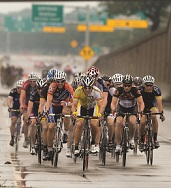
From year to year, sports fluctuate in popularity. A specific form of fitness can become high-profile and everyone wants to try it. It happens in sports events for seniors as well. In 2013, pickleball became a medal sport; prior to that, it was a demonstration sport. As anyone who watches sports trends can tell you, pickleball is exploding in popularity nationwide.
We’re always tracking what fitness programs are out there and how they’re growing. If someone is interested in suggesting a new sport to be added to The Games, they can submit documentation (procedure is in our Rule Book online). New sports and events are approved by the NSGA National Senior Games Committee and the Board of Directors. We also ask our host city to select the demo sports that are popular in their area. For 2015, we will welcome three demonstration sports to The Games: baseball, disc golf and judo.
The city is important for senior sports events
As noted, this year's National Senior Games are in Minnesota, and our 2017 Games will be in Birmingham, Alabama. We now have an RFP for the 2019 Games. When we look for a host site, we have a number of factors in mind. We’re looking for perhaps a medium-size city that will embrace our event and welcome and promote it. For example, in 2013 our athletes were really happy with the way Cleveland welcomed them with participant discounts in restaurants, and event-branded signage met them everywhere.
Of course, athletic venues are critical. We require facilities that are easily accessible, spectator-friendly and of high quality. Our events for The Games are archery, badminton, basketball, bowling, cycling, golf, horseshoes, pickleball, race walking, racquetball, road racing, shuffleboard, softball, swimming, table tennis, tennis, track & field, triathlon, volleyball, plus three non-ambulatory sport divisions – bowling, horseshoes and shuffleboard.
We like to talk about having ‘hubs’ for people during their stay. At our Games we have The Village: A Health and Wellness Expo and Athlete Experience sponsored by Astra Zeneca Diabetes which is the epicenter of activity. It is a gathering place for athletes and spectators alike. Each day will have different activity and programs for everyone to enjoy.
Generally, we place The Village is placed in the convention center where we have athlete check-in, vendors, exhibits and booths. We surround this with sport areas with competition each day that adds to the atmosphere of excitement. If athletes are not competing, they can always come to The Village to relax and socialize. We even have The Cyber Cafe sponsored by AstraZeneca Diabetes offering connectivity so athletes can check their e-mail, charge mobile devices and socialize with friends and family.
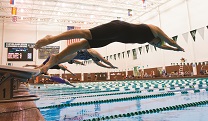
Athletes inspire others
Earlier, we mentioned the social aspect of sports, but that really goes deeper. Senior athletes inspire their friends and their family members – and even strangers. We’re seeing more mothers and daughters, dads and sons competing. Plus, we see athletes bringing their grandchildren to watch them and cheer them on. That’s the best kind of feedback you can get on an event – when people bring the next generation with them. You hope that one day, those kids will be competitors themselves, and will be just as proud to be there as their grandparents were.

